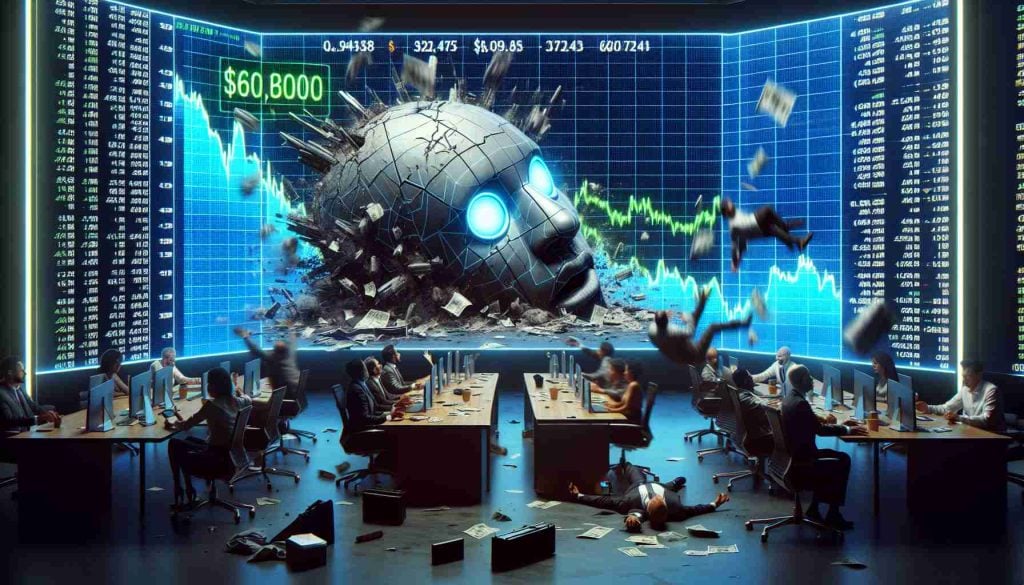Understanding Today’s Market Turmoil
The stock market experienced unprecedented turmoil as Nvidia’s shares plummeted nearly 17%, marking its steepest decline since March 2020. This drastic drop resulted in a monumental loss of around $600 billion in market capitalization, setting a record for the largest single-day decline of any U.S. company.
The catalyst for this intense sell-off was the unveiling of a new AI model by Chinese startup DeepSeek. This model reportedly operates on significantly less powerful hardware compared to what U.S. firms use, casting doubts on the massive investments made in AI technology by American corporations. Analysts suggested that the financial commitment to high-end chips may not be warranted, leading to fears of an inflated market bubble.
Energy stocks, particularly those linked to tech sectors, felt the pressure as well. Companies like Vistra and Talen Energy saw their shares tumble by nearly 30%, while others succumbed to more than 20% declines, erasing any gains made earlier this year.
Despite the chaos, not all sectors were hit equally. While the tech-heavy Nasdaq Composite faced severe losses, defensive stocks found traction as investors sought stability amidst the storm. Notably, some companies, including Salesforce and Adobe, even recorded gains, hinting at a possible shift in investor sentiment towards more sustainable AI solutions.
As the volatility unfolds, market watchers brace for continued fluctuations in the tech landscape.
The Ripple Effects of Market Volatility
The recent upheaval in the stock market, particularly driven by Nvidia’s staggering decline, underscores a broader instability within the global economy. The phenomenon highlights the precarious balance between innovation and speculative investment, sending ripples through various sectors. As American companies grapple with disillusionment over their heavy investments in AI, the implications stretch far beyond immediate financial losses; they signal potential shifts in employment trends and technological research directions.
Societal impacts are notable, as layoffs could follow, particularly in high-tech industries where workforce expansion has often been tied to stock performance. Companies may rein in their spending on labor and R&D, stifling innovation at a time when economic growth hinges on technological advancement. Furthermore, a decline in investor confidence may hinder startups and emerging tech firms from accessing necessary funding, exacerbating inequalities in access to capital.
On the environmental front, a shift away from certain tech investments could slow progress in clean energy technologies, particularly if firms pivot away from high-capacity computing systems that facilitate AI in energy efficiency. As industries reconsider their business models, a more sustainable approach could emerge, focusing on less resource-intensive technologies.
In terms of future trends, this volatility might accelerate the need for regulatory scrutiny over AI technologies, prompting governments to intervene to stabilize markets. The long-term significance may rest on whether companies prioritize resilience over rapid growth, ultimately crafting a more balanced and less speculative market environment in the years to come.
Market Meltdown: What’s Behind the Unprecedented Plunge in Tech Stocks?
Understanding Today’s Market Turmoil
The stock market has witnessed significant upheaval in recent days, notably sparked by Nvidia’s alarming share price drop of nearly 17%, translating to a staggering $600 billion loss in market capitalization. This sharp decline marks the steepest fall for Nvidia since March 2020 and highlights deeper concerns regarding the technology sector’s stability, particularly in the wake of emerging AI innovations.
Key Factors Contributing to the Decline
The catalyst for this market turmoil was the announcement of a new artificial intelligence model by Chinese startup DeepSeek. This model promises to operate efficiently on hardware that is significantly less robust than that commonly employed by major U.S. firms. This breakthrough raises critical questions about the necessity and sustainability of the massive investments made by American companies in high-end AI technology. Many analysts believe that these investments may have inflated a market bubble, leading to heightened volatility in the tech sector.
Impact on Related Industries
Energy stocks, especially those intertwined with technology sectors, also faced severe repercussions. Companies such as Vistra and Talen Energy reported nearly 30% declines in their stock prices, while various others experienced drops exceeding 20%. These losses wiped out earlier gains, indicating a broader trend of reevaluation among investors in a turbulent market.
Resilience in Defensive Stocks
While the tech-heavy Nasdaq Composite index faced severe losses, not all sectors reacted similarly. Defensive stocks emerged as refuges for uneasy investors, demonstrating resilience amidst the turmoil. Companies like Salesforce and Adobe even saw gains, suggesting a pivot in investor priorities towards more stable and sustainable technology solutions—an important trend considering the fluctuating landscape of AI investments.
Market Analysis and Future Predictions
As analysts continue to scrutinize the fallout from these developments, market watchers predict ongoing fluctuations within the tech landscape. Investment strategies may shift as companies and investors alike reassess the viability of existing AI technologies and the potential benefits of more sustainable approaches.
Pros and Cons of the Current Market Dynamics:
– Pros:
– Opportunity for long-term investments in resilient sectors.
– Potential growth in companies focusing on sustainable AI technologies.
– Cons:
– Increased volatility and uncertainty leading to potential losses.
– Diminishing confidence in high-value tech stocks, which could result in further market corrections.
Insights into Innovations and Trends
This disruption in the market also sheds light on broader trends regarding the adoption of AI technologies worldwide. As international competitors introduce innovative solutions requiring less investment in advanced hardware, U.S. companies may need to adjust strategies to remain competitive. Future investment in AI may increasingly favor cost-effective and sustainable innovations over massive high-end infrastructures.
Conclusion
As the tech market endures this tumultuous period, both investors and corporations must navigate the complexities of an ever-evolving landscape. Understanding the implications of innovations from startups like DeepSeek will be crucial in shaping future investments and ensuring stability in the market.
For ongoing updates and insights into market trends, visit Forbes.
